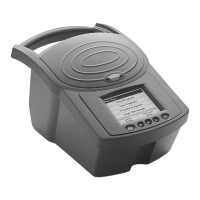Chlorine Dioxide
Chlorine Dioxide
ChlorineDio_Other_Low_AMA_Eng_Ody.fm Page 3 of 4
Sample Collection, Storage and Preservation
Analyze samples for chlorine dioxide immediately after collection. Chlorine
dioxide is a strong oxidizing agent and is unstable in natural waters. It reacts
rapidly with various inorganic compounds, but oxidizes organic compounds
more slowly. Many factors, including reactant concentrations, sunlight, pH,
temperature, and salinity influence decomposition of chlorine dioxide in water.
Avoid plastic containers since these may have a large chlorine dioxide demand.
Pretreat glass sample containers to remove any chlorine or chlorine dioxide
demand by soaking in a dilute bleach solution (1 mL commercial bleach to 1 liter
of deionized water) for at least one hour. Rinse thoroughly with deionized or
distilled water. If sample containers are rinsed thoroughly with deionized or
distilled water after use, only occasional pretreatment is necessary.
A common error in testing for chlorine dioxide is not obtaining a representative
sample. If sampling from a tap, let the water flow for at least 5 minutes to ensure
a representative sample. Let the container overflow with the sample several
times, then cap the sample containers so there is no headspace (air) above the
sample. If sampling with a sample cell, rinse the cell several times with the
sample, then carefully fill to the 10-mL mark. Perform the chlorine dioxide
analysis immediately.
Accuracy Check
Standard Solution Method
Preparing chlorine dioxide standards is difficult and dangerous. In addition,
these standards are both explosive and volatile! Only a trained chemist should
prepare the standards using appropriate safety equipment and precautions.
Hach does not recommend preparation of chlorine dioxide standards. If
independent standard preparation is required, please see the instructions in
Standard Methods for the Examination of Water and Wastewater, 20th ed., under
the headings “Stock chlorine dioxide solution” and “Standard chlorine
dioxide solution” (pp 4–74 and 4–75). Prepare a 0.25-mg/L (250-µg/L)
chlorine dioxide standard.
Method Performance
Precision
Standard: 250 µg/L
ClO
2
See Section 3.4.3 Precision for more information, or if the standard concentration
did not fall within the specified range.
Sensitivity
See Section 3.4.5 Sensitivity for more information.
Program 95% Confidence Limits of Distribution
78 192–308 µg/L ClO
2
Portion of Curve ∆Abs ∆Concentration
Entire Range 0.010 24 µg/L ClO
2

